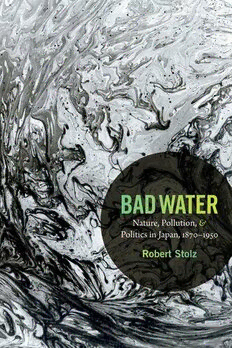
Bad Water: Nature, Pollution, and Politics in Japan, 1870–1950 PDF
Preview Bad Water: Nature, Pollution, and Politics in Japan, 1870–1950
BBAADD WWAATTER Asia- Pacific culture, politics, and society Editors: Rey Chow, Michael Dutton, H. D. Harootunian, and Rosalind C. Morris Nature, Pollution, and Politics in Japan, 1870– 1950 Robert Stolz Duke University Press Durham and London 2014 © 2014 Duke University Press All rights reserved Printed in the United States of America on acid- free paper ∞ Typeset in Arno Pro by Westchester Books Designed by Courtney Leigh Baker Library of Congress Cataloging- in- Publication Data Stolz, Robert, 1970– Bad water : nature, pollution, and politics in Japan, 1870–1950 / Robert Stolz. Pages cm — (Asia-Pacifi c: culture, politics, and society) ISBN 978-0-8223-5690-5 (cloth : alk. paper) ISBN 978-0-8223-5699-8 (pbk. : alk. paper) 1. Environmental protection—Political aspects—Japan. 2. Pollution—Political aspects—Japan. I. Title. II. Series: Asia-Pacifi c. TD187.5.J3S76 2014 363.730952'09041—dc23 2013050759 Studies of the Weatherhead East Asian Institute, Columbia University Th e Studies of the Weatherhead East Asian Institute of Columbia University were inaugurated in 1962 to bring to a wider public the results of signifi cant new research on modern and contemporary East Asia. Contents Ac know ledg ments ix introduction 1 one A De cade of Leaks 19 two Pollution and Peasants at the Limits of Liberalism 51 three Nature over Nation Tanaka Shōzō’s Environmental Turn 85 four Natural Democracy 117 five The Original Green Company Snow Brand Dairy 159 conclusion Bad Water, a Theoretical Consideration 191 Appendix Tanaka and Kōtoku’s Appeal to the Meiji Emperor 207 Notes 211 Bibliography 243 Index 259 ac know ledg ments Bad Water is the result of a project over a dozen years in the making. Over this time I have benefi ted from the help and support of numerous teachers, friends, institutions, and family. I apologize in advance to anyone I failed to mention but who nonetheless deserves my thanks. I must express my deepest gratitude to Tetsuo Najita and James Ketelaar for their insistence on the importance and intellectual stakes of historical investigation. Both de- serve special thanks for teaching me to be a better reader, writer, and thinker. Th eir passion for sustained, deep thinking not only, I hope, informs this book but is also a model I have tried my best to emulate in research and the classroom. With them, Harry Harootunian has also inter- vened at key points of this pro cess, helping me to try to combine theoretical analysis with daily practice. Needless to say, any stumbles in this area in the pages that follow remain mine alone. Brett Walker and Julia Th omas kindly read the entire manuscript when it was at its roughest. Carol Gluck graciously took on this project at the Weatherhead East Asian Institute at Columbia University, and she and Dan- iel Rivero stuck with it through all the ups and downs. I am also thankful to the readers from both the Weather- head Institute and Duke University Press, whose substan- tial and thoughtful comments surely improved the fi nal version. Others who read parts include Prasenjit Duara, Norma Field, Anne Walthall, Douglas Howland, Gregory
